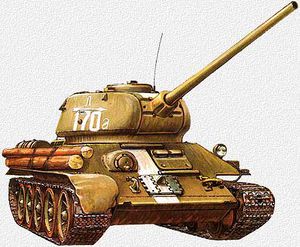Difference between revisions of "Tank"
| Line 2: | Line 2: | ||
'''Tanks''' are [[Armored Fighting Vehicle]]s characterized by thick armor and heavy weapons. They are designed as mobile weapon platforms, so they have no space to carry troops other than their required crews (although their have been instances in which soldiers have road on the outside of a tank). A typical crew consists of a driver, one or two gun crew, and a commander. | '''Tanks''' are [[Armored Fighting Vehicle]]s characterized by thick armor and heavy weapons. They are designed as mobile weapon platforms, so they have no space to carry troops other than their required crews (although their have been instances in which soldiers have road on the outside of a tank). A typical crew consists of a driver, one or two gun crew, and a commander. | ||
Modern tanks are tracked vehicles used primarily for line-of-sight combat, armed with [[cannon]]s and [[firearm|machine guns]]. The first tanks were built during the [[Great War]] by the British as a means of overcoming German trench lines, | Modern tanks are tracked vehicles used primarily for line-of-sight combat, armed with [[cannon]]s and [[firearm|machine guns]]. The first tanks were built during the [[Great War]] by the British as a means of overcoming German trench lines. While they did have some success, they were slow, cumbersome, temperamental, difficult to produce and inefficiently used. Proper doctrine and design strategy for using tanks would not develop until [[World War II]]. Several subclasses of tanks have been employed including light tanks, amphibious tanks and main battle tanks. Several defunct classes have been used but are no longer in service, including Tankettes, Cruiser Tanks, Infantry Tanks and Heavy Tanks. | ||
Tanks got their name from a ploy to avoid German intelligence discovering their first deployment; the British described them as "mobile water tanks" when shipping them to the front. The name stuck everywhere (with some local corruptions) except [[Germany]] (were they are refered to as ''panzers'') and France (where they are refered to as ''char de combat''). | Tanks got their name from a ploy to avoid German intelligence discovering their first deployment; the British described them as "mobile water tanks" when shipping them to the front. The name stuck everywhere (with some local corruptions) except [[Germany]] (were they are refered to as ''panzers'') and France (where they are refered to as ''char de combat''). | ||
Revision as of 02:38, 2 November 2012

Tanks are Armored Fighting Vehicles characterized by thick armor and heavy weapons. They are designed as mobile weapon platforms, so they have no space to carry troops other than their required crews (although their have been instances in which soldiers have road on the outside of a tank). A typical crew consists of a driver, one or two gun crew, and a commander.
Modern tanks are tracked vehicles used primarily for line-of-sight combat, armed with cannons and machine guns. The first tanks were built during the Great War by the British as a means of overcoming German trench lines. While they did have some success, they were slow, cumbersome, temperamental, difficult to produce and inefficiently used. Proper doctrine and design strategy for using tanks would not develop until World War II. Several subclasses of tanks have been employed including light tanks, amphibious tanks and main battle tanks. Several defunct classes have been used but are no longer in service, including Tankettes, Cruiser Tanks, Infantry Tanks and Heavy Tanks.
Tanks got their name from a ploy to avoid German intelligence discovering their first deployment; the British described them as "mobile water tanks" when shipping them to the front. The name stuck everywhere (with some local corruptions) except Germany (were they are refered to as panzers) and France (where they are refered to as char de combat).
List of Real Life Tanks
- British Mark V tank (United Kingdom)
- T-34 (Union of Soviet Socialist Republics)
- Panzer-V Panther (Nazi Germany)
- Leopard-II (Federal Republic of Germany)
- Type 99 (People's Republic of China)
- M1 Abrams (United States of America)
Tanks in Science Fiction
In addition to conventional tanks which move along on caterpillar tracks, science fiction often includes hover-tanks: tanks that levitate above the ground to better traverse terrain. In other instances in science fiction, tanks are completely automated robots. Tanks larger than real life armored fighting vehicles also appear in science fiction, some being able to rival battleships in their scale.
- AAT (Star Wars)
- Leman Russ Tank (WH40K)
- Baneblade (WH40K)
- Terran Siege Tanks (Starcraft)
- Fire Nation Tanks in Avatar: The Last Airbender